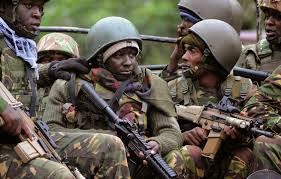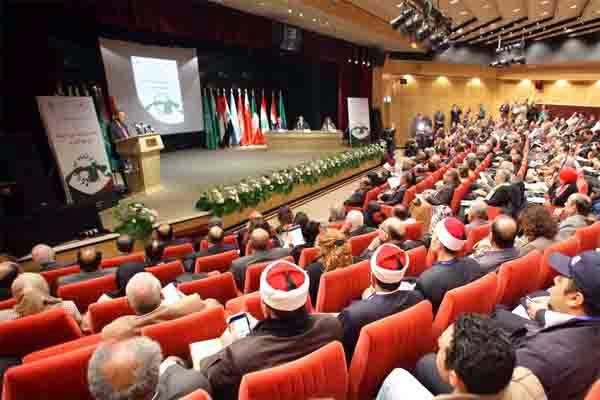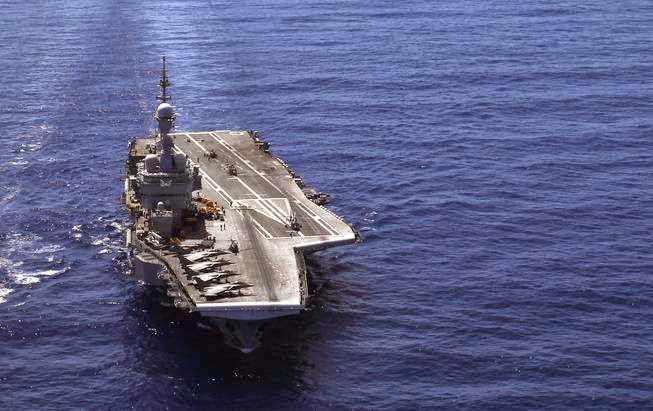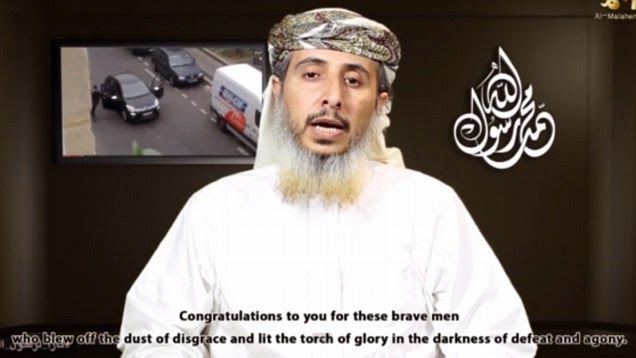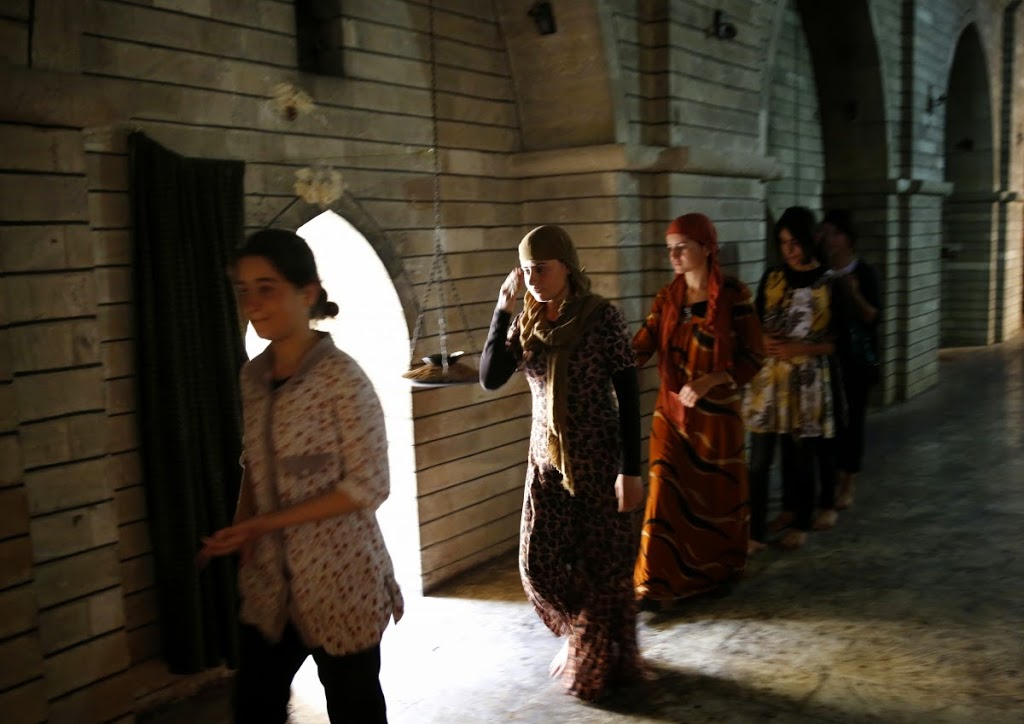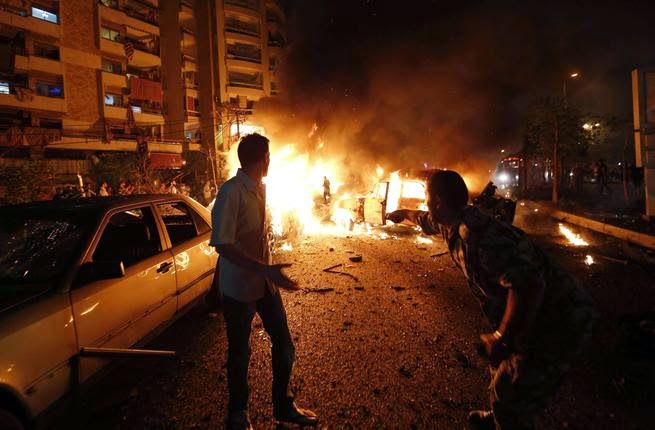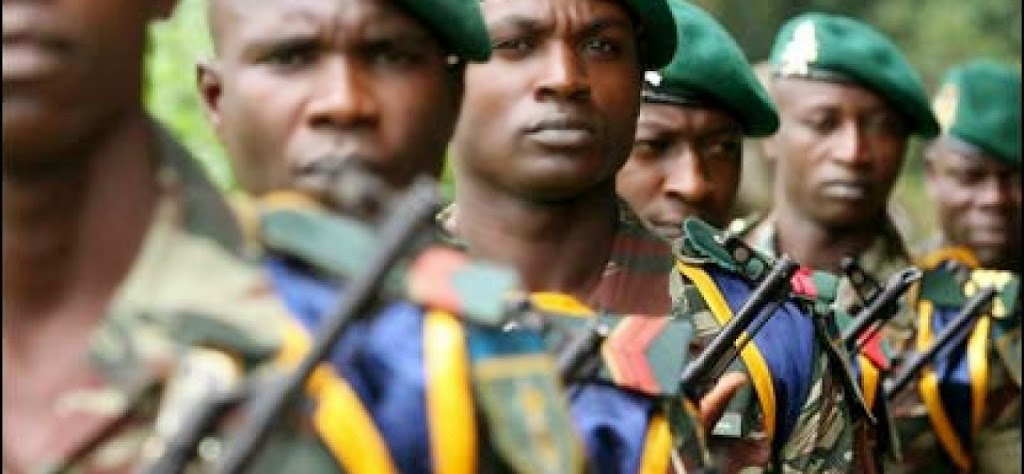Are there any prospects for Moscow-Libya cooperation?
Egypt hosts summit against islamic extremism
France sends Charles de Gaulle aircraft carrier to help U.S. fight Islamic State militants
France ordered prosecutors around the country to crack down on hate speech, anti-Semitism and glorifying terrorism and announced Wednesday it was sending an aircraft carrier to the Mideast to work more closely with the U.S.-led coalition fighting Islamic State militants.
Authorities said 54 people had been arrested for hate speech and defending terrorism in the last week. The crackdown came as Charlie Hebdo’s defiant new issue sold out before dawn around Paris, with scuffles at kiosks over dwindling copies of the satirical weekly that fronted the Prophet Muhammad anew on its cover.
After terror attacks killed 20 people in Paris last week, including three gunmen, President Francois Hollande said the situation “justifies the presence of our aircraft carrier.” One of the gunmen had claimed allegiance to the Islamic State group.
France is already carrying out airstrikes against the extremist group in Iraq. Hollande spoke aboard the Charles de Gaulle aircraft carrier to members of France’s military.
Since the attacks, France has deployed 10,000 troops and 120,000 security forces in an area the size of Texas to protect sensitive sites, including Jewish schools and synagogues, mosques and travel hubs.
France has been tightening security and searching for accomplices since the terror attacks began, but none of the 54 people mentioned Wednesday have been linked to the attacks. That’s raising questions about whether Hollande’s Socialist government is impinging on the very freedom of speech that it so vigorously defends when it comes to Charlie Hebdo.
Among those detained was Dieudonne, a popular yet controversial comic who has repeated convictions for racism and anti-Semitism.
Like many European countries, France has strong laws against hate speech, especially anti-Semitism in the wake of the Holocaust.
In a message distributed to all French prosecutors and judges, the Justice Ministry laid out the legal basis for rounding up those who defend the Paris terror attacks as well as those responsible for racist or anti-Semitic words or acts. The order did not mention Islam.
A top leader of Yemen’s al-Qaida branch claimed responsibility Wednesday for the Charlie Hebdo attack, saying in a video the massacre came in “vengeance for the prophet.” The newspaper had received repeated threats previously for posting caricatures of Muhammad.
The core of the irreverent newspaper’s staff died a week ago when gunmen stormed its offices, killing 12 people and igniting three days of bloodshed around Paris that left 17 victims dead. The attacks ended Friday when security forces killed both gunmen and an accomplice who separately seized hostages at a kosher grocery.
Working out of borrowed offices, Charlie Hebdo employees who survived put out the issue that appeared Wednesday with a print run of 3 million — more than 50 times the paper’s usual circulation. After the weekly sold out, kiosk operators told people to return Thursday for a second run.
French police say as many as six members of the terror cell may still be at large, including a man seen driving a car registered to the widow of one of the gunmen. Officials say the widow is now in Syria. There has been no word on the whereabouts of the driver or the car.
The Justice Ministry said the 54 people included four minors and several had already been convicted under special measures for immediate sentencing. Inciting terrorism can bring a 5-year prison term — or up to 7 years for inciting terrorism online.
In its message to prosecutors and judges, the ministry said it was issuing the order to protect freedom of expression from comments that could incite violence or hatred. It said no one should be allowed to use their religion to justify hate speech.
“We have all heard ‘Yes, I support Charlie, but,’ the double standards, the ‘Why defend liberty of expression here and not there?'” Education Minister Najat Vallaud Belkacem said. “These questions are intolerable above all when we hear them at school, which has the duty to teach our values.”
The government order warned authorities to be particularly attentive to any incidents that could lead to urban unrest or violence against police. That suggested the government fears new riots like the wave that swept through France’s neglected housing projects and immigrant communities a decade ago.
The government is writing broader new laws on phone-tapping and other intelligence to fight terrorism, spokesman Stephane Le Foll said. It also is launching a deeper project to rethink France’s education system, urban policies and integration model, in an apparent recognition that last week’s attacks exposed deeper problems about inequality in France, especially at its housing projects.
Dieudonne, a comic who popularized an arm gesture that resembles a Nazi salute and who has been convicted repeatedly of racism and anti-Semitism, is no stranger to controversy. His provocative performances were banned last year but he has a core following among France’s disaffected youth.
In a Facebook post that was swiftly deleted, the comic said he felt like “Charlie Coulibaly” — merging the names of Charlie Hebdo and Amedy Coulibaly, the gunman who killed four hostages at a kosher market Friday, a day after he killed a Paris policewoman.
In a separate post, the comic wrote an open letter to France’s interior minister.
“Whenever I speak, you do not try to understand what I’m trying to say, you do not want to listen to me. You are looking for a pretext to forbid me. You consider me like Amedy Coulibaly when I am not any different from Charlie,” he wrote.
Coulibaly had claimed allegiance to the Islamic State group while Said and Cherif Kouachi, the two brothers behind the Charlie Hebdo massacre, had told survivors they were sent by al-Qaida in Yemen.
In an 11-minute video Wednesday, Nasr al-Ansi, a top commander of Al-Qaida in the Arabian Peninsula, or AQAP, said Yemen’s al-Qaida branch “chose the target, laid out the plan and financed the operation.”
US intelligence officials, however, said they have no evidence AQAP coordinated the attack or knew about it in advance. The officials spoke on condition of anonymity because they weren’t authorized to discuss classified matters publicly.
Solidarity for Charlie Hebdo, although not uniform, was widespread in France and abroad Wednesday and the new issue vanished from kiosks immediately. One newsstand near the Champs Elysees opened at 6 a.m. and was sold out in five minutes. Another, near Saint-Lazare, reported fisticuffs among customers.
Defending his caricature of Muhammad on the paper’s latest cover, Charlie Hebdo cartoonist Renald Luzier argued that no exceptions should be made when it comes to the freedom of expression.
He said when the weekly was threatened in the past, the reaction was often: “Yes, but you shouldn’t do that (publish cartoons of Muhammad). Yes, but you deserved that.”
“There should be no more ‘Yes, but,” he insisted.
French Interior Minister Bernard Cazeneuve was among those getting a copy before they sold out.
“I rediscovered their liberty of tone,” he told France-Inter radio.
French Prime Minister Manuel Valls displayed a copy of the satirical paper as he left a Cabinet meeting Wednesday but his hand carefully covered Muhammad’s face.
Al-Qaeda in Yemen claims attack on Charlie Hebdo
Jihadist movement says it carried out Paris assault as ‘vengeance for the prophet,’ warns of more attacks
Nasr al-Ansi, a top commander of Al-Qaeda in the Arabian Peninsula, or AQAP as the branch is known, appeared in an 11-minute Internet video, saying that the massacre at Charlie Hebdo was in “vengeance for the prophet.” The paper had published cartoons of the Prophet Muhammad, which is considered an insult in Islam.
Turkey moves to ban Twitter, Facebook again
Turkish authorities have warned that all websites publishing alleged records related to Syrian-bound trucks belonging to the Turkish intelligence agency that were stopped by a prosecutor last year will be banned, presaging a possible new ban on Twitter and Facebook.
Twitter has quickly removed the content, while many other websites have not yet complied.
On Jan. 2, 2014, two Syria-bound trucks belonging to Turkey’s National Intelligence Organization (MİT) were stopped by a prosecutor who sought to have the gendarmerie search the vehicles. The following month, a Turkish court issued a ban on the publication of news related to the incident.
A number of documents were leaked online on Jan. 13. The signed proceedings related to the search allegedly show that arms belonging to MİT were found in the trucks. Speculation has been rife that the arms were destined for jihadists in Syria.
Turkish officials, now equipped with the authority to block websites even without a court ruling, warned Jan. 14 that the gag order would be strictly imposed on the Internet. Any website, including Facebook and Twitter, will be blocked if they do not remove the leaked documents.
Twitter quickly withheld the sanctioned content on Jan. 14, dodging the possible Turkish ban. Facebook, on the other hand, has not yet complied with the decision, Turkish authorities said, noting that the talks were continuing.
“There are several court decisions against the websites that published the signed proceedings,” a Turkish official told daily Hürriyet, stressing that the “procedure is ongoing.”
Turkey blocked access to Twitter, hours after then-Prime Minister Recep Tayyip Erdoğan vowed to close down the social media platform on March 20, 2014.
YouTube was banned in Turkey on March 27, hours after a top-secret government meeting on Syria was leaked allegedly depicting government officials discussing a possible false-flag operation on Turkey in an effort to drag Turkey into Syria’s war.
The Constitutional Court unblocked Twitter on April 2, 2014, and YouTube on May 29, 2014, citing freedom of expression, but the ruling drew the ire of the government.
Source: hurriyetdailynews
Would Kurdistan Region authorize an abortion law for the raped women by ISIS?
The “abortion” issue has raised large debate in corridors of politics and the street to Kurdistan Region after the pregnancy of some women who have been raped by the elements of the Islamic State of Iraq and Syria “ISIS” organization, during the period of their detention
.
Kurdish , Turkmen and Yazidi politicians supported that kind of abortion, while some clerics refused it for violating the teachings of Shariah
.
The abortion file began to float on the surface, after it had been discussed behind closed doors for several months, what caused serious social repercussions, especially since the Iraqi law and Islamic law prohibit carrying out abortions
.
For that , a group of parliamentarians interested in human rights in Kurdistan region started to work on wording the draft law that provides exceptional law for those women to have abortions
.
While The decision maker of the Committee for the Defense of Women’s Rights in the region , Hayat Majeed Qader , one of advisers in the Parliament has developed a draft law allowing abortion exceptionally for girls and women who survived from the grip of ISIS militants, as pregnancy appeared on them after being exposed to sexual assault
.
She said in a report of Anatolia News agency seen by “Shafaq News” that “ abortion in such a case is not a crime, it is the best solution from the standpoint of a humanitarian solution
.
The MP and Chairwoman of the Women Committee in Kurdistan Region , Bakhshan Zangana noted that the subject of abortion is particularly sensitive within Iraqi society
.
She added that Iraqi women who have been abducted by ISIS members then got pregnant after their exposure to sexual assaults during their period of captivity are living a very difficult situation, as some are fifth or sixth month pregnant
.
Zangana explained that the matter take dimensions at the individual, family and social level, “as ISIS elements organization who committed massacres of genocide against the Iraqi people also wanted to plant their dirty seed in the lives of our women and our girls, so we must us address this issue with courage .”
While the official of Yazidi religious affairs Department in the Ministry of Endowment and Religious Affairs in Kurdistan , Khairi Chenkali stressed, that the acceptance of children who came to life illegally issue cannot be accepted.
“We as a society have habits and Kurdish traditions, we are very conservative towards issues related to honor, and what had been done by ISIS elements of assault and rape Yazidi women and other Iraqi women, aimed at smearing the sacred values of the Yezidis
.”
He pointed out that “most of the families are strongly opposed to women to give birth and were been subjected to rape,” noting that “the Yazidis clergy have directed calls to help the victims of ISIS attacks “
.
The MP in Kurdistan Parliament from the Iraqi Turkmen Front .Aiden Maarof demanded to perform an exceptional measure to open the way for an abortion for women who are victims of ISIS attacks, pointing out that 62 Yazidi and Turkmen woman have been raped by members of ISIS terrorist organization
.
Maarof said, ” Kurdistan Parliament should take a special resolution to fit women who have been raped, enacting a law to allow abortions
.”
As the Head of Islamic scholars Union of Kurdistan , Abdullahi Sheikh Saeed addressed the issue of the victims of ISIS attacks in accordance with the teachings of Islamic Sharia
.
“It cannot be overlooked that these children were born illegally, but this doesn’t give us the right to kill them, Islam does not accept that, what was done by ISIS elements is against the teachings of Islam”.
ISIS had kidnapped hundreds of girls and women from different ethnic groups, especially Yazidis during the invasion of the north and west of the country last summer
.
Militants had sold the women and girls on ISIS elements in slavery markets for sexual pleasure, which led to the emergence of signs of pregnancy on women after fleeing from the grip of militants
.
This has led a number of members of Kurdistan Parliament to move towards a law that gives way to perform exceptional abortions, without exposure to prosecution, especially since the Iraqi law prohibits doing this type of operations.
Source: shafaaq.com
Lebanon’s security forces fear an increase in suicide bombings
Up to 32 Lebanese youths are preparing to carry out suicide attacks inside Lebanon. The security services are tracking down around 200 suspects who might have links to al-Nusra Front (ANF) and Daesh, after the two groups decided to resume attacks in the country. Once again, Lebanon is vulnerable to devastating suicide attacks.
Suicide bombers Bilal Mohammed al-Mariyan and Taha Samir al-Khayal have reignited the spark of suicide attacks in Lebanon. According to security reports, Lebanon is now once again caught in the crucible of suicide bombings, and many security sources fear the country may be entering a dangerous phase. Jihadis are also talking about a heated next phase. This means that the suicide bombers that struck Jabal Mohsen will not be the last, but rather, they may be the opening salvo, or the “first rain,” according to an ANF source in Lebanon.
Interior Minister Nuhad al-Mashnouq had announced that the bombers were affiliated to Daesh, based on security reports linking them to Munther al-Hassan, a man suspected of distributing explosive vests. Hassan was killed during a raid by the Information Branch in Tripoli. However, Daesh has not claimed responsibility for the attack. Furthermore, the ANF source says the two men had pledged allegiance to ANF nearly a year ago. The source said, “Khayal comes from a non-religious family. His father is an informant for Lebanese security services.”
Either way, security reports indicate both Daesh and ANF intend to carry out attacks in Lebanon.
Oddly, the identity of the perpetrators of the twin bombing was revealed in the Lebanese media before ANF claimed responsibility for the attack and named the two men in messages exchanged with Anatolia News Agency. Moreover, ANF made the same mistake as the media in identifying the two suicide bombers, naming Khayal as “Kayyal.”
In parallel, security sources say there are reports a group of Lebanese suicide bombers have been recruited from various regions, primarily from Tripoli and Saida (Sidon). According to the same reports, it takes nearly a month to train and prepare a suicide bomber, bearing in mind that new recruits undergo training supervised by explosives experts.
The reports reveal that the man in charge of training Lebanese inghimassis [hybrid guerilla fighters-suicide bombers] is Lebanese national O.S. better known as Abu al-Farouq. The reports state the main goal of the planned attacks would be Shias and Alawis, or “Nusayris” as ANF and jihadis refer to them pejoratively.
This information is consistent with intelligence obtained by security services from their surveillance operations that focus on Lebanese nationals fighting in Syria, especially in Daesh-controlled regions. The security services have counted more than 200 IS-affiliated individuals who returned from Syria, and who are suspected to have come back in preparation for attacks in Lebanon.
Sources reckon that around 30 Lebanese youths have been assigned to carry out attacks in Lebanon. This coincides with a decision by Daesh to begin covert operations in Lebanon, according to the security sources. Some of the suspects have been identified while others linked to them or to recruitment networks have been arrested, the sources said.
In the meantime, leaks by ANF-affiliated jihadists corroborate reports regarding the return of dozens of fighters who were in Syria. However, jihadi sources make the distinction between two types of returnees, saying, “Some of the brethren left Syria to escape the fighting between Daesh and ANF, while others have been ordered to return.”
According to the same jihadi sources, “The orders were for them to return to operate in Lebanon.” “The order is for them to join sleeper cells until they are activated.” Regarding the reason why jihadi attacks had seen a hiatus in Lebanon, ANF sources say this was meant to “recruit, equip, and prepare, and learn lessons from previous experiences because operations in Lebanon are not based on mobile combat but on covert work at their core.”
On Sunday night, ANF posted on its official Twitter account a statement numbered 22, in which it officially claimed responsibility for the attack on a café in Jabal Mohsen. ANF wrote that the twin attack was to “avenge the bombing of al-Salam and al-Taqwa mosques and for letting criminals roam free.” The statement also said Bilal al-Mariyan raided the café and detonated his explosive vest against the “crowds of Nusayris present there,” while Taha al-Khayal waited a few minutes before he detonated his vest against “security elements who rushed to the scene of the first explosion.”
Source: albawaba.com
‘Yemen could have helped avoid Paris attacks’
Yemeni security officials said the United States and France failed to pass on intelligence information about Said Kouachi, one of the brothers behind the attack on a French magazine who trained with Al Qaeda in the Arabian Peninsula.
Yemen was unaware that Kouachi was under surveillance and a possible terror threat when he travelled on a number of occasions to Yemen between 2009 and 2011. The officials said the same mistake was made with Umar Abdulmutallab, who tried to bring down an airliner in 2009 by detonating explosives hidden in his underwear.
“Our western allies never raised red flags on the two prior to them entering Yemen. If intelligence was shared, Yemen could have helped avoid both attacks,” a senior Yemeni security official told The National.
The two attackers once lived across the hall from each other just months before Abdulmutallab attempted the failed attack on a Northwest Airlines flight between Amsterdam and Detroit on Christmas Day. He was jailed for life in the US in February 2012.
“Yemen only keeps surveillance on visiting foreigners when alerted,” the official added.
Said, the eldest of the Kouachi brothers behind the Paris attack, first arrived to Yemen in 2009 to study Arabic at the Sanaa Arabic Institute, the same institute that Abdulmutallab attended. To lure students, the institute offered accommodation and an entry visa. This made the college popular with westerners wanting to learn Arabic.
The French-born son of Algerian parents, Said entered Yemen at least two twice with an official study visa, according to two Yemeni security officials. Said’s first visit was in 2009 and stretched until mid-2010. He then left Yemen for a few months before coming back and staying for eight more months.
It was during this time that he is thought to have trained with AQAP.
The US increased surveillance of westerners travelling in and out of Yemen after Abdulmutallab’s failed attack. French authorities said he was a suspect because he was on the “periphery of judicial cases” involving his brother, Cherif, who was arrested in 2005 for trying to travel to Iraq, via Syria.
The US alerted France to Said after his 2011 trip to Yemen and the French authorities placed him under surveillance. But that monitoring was stopped, according to the The New York Times.
Mohammed Al Kibsi, a Yemeni reporter met Said twice, the first being in January 2010 while investigating Abdulmutallab’s links to the extremist group. “I first met Said near the house Abdulmutallab lived in, while he played football with neighbours,” said Mr Al Kibsi.
When Mr Al Kibsi first approached Said, he asked if he knew Abdulmutallab. Said responded saying they were good friends. “Said and Umar became good friends after meeting and living together in a dormitory rented out by the institute they studied in,” said Mr Al Kibsi.
Said was not the only French national studying Arabic in the institute at the time. At least 14 French students were there the same period as Said, said Mr Al Kibsi.
“Dozens of French nationals, mostly converts, come to Yemen every year either to learn Arabic or Islamic Studies,” said Ali Al Shami, an immigration official at Yemen’s interior ministry.
Said kept a low profile and lived next to Al Tabari School while offering prayers at the Al Tabari Mosque near his residence. “People living in that area are least suspected of terrorism involvement. It’s a predominantly Zaidi Shiite neighbourhood where Sunni extremists are never welcomed,” said Ahmed Al Bahri, an expert on extremists.
When Mr Al Kibsi coincidentally met Said the second time late in 2011 his visa had almost expired.
“He was sitting outside…and told me he needed to extend his study visa,” Mr Al Kibsi said. This was because the Sanaa Arabic Institute that first sponsored Said was closed down after its foreign students left the country following strict government surveillance that began around 2010, Mr Al Kibsi said it was around this time that Said might have travelled north to Al Jawf province for several weeks to train with AQAP.
Yemeni officials believe that Said visited the Dar Al Hadith Salafi Learning Center in Saada province multiple times to cover up his training mission in neighbouring Al Jawf. Officials are not aware what specific training Said underwent.
Nearly a thousand foreigners lived in Dammaj, a town in Saada province, until last year. The Yemeni government deported nearly all foreigners who studied and lived in Dammaj. “We were worried Dammaj could be used as a route for foreigners who did not want to study but rather get closer to AQAP training camps,” a Yemeni counterterrorism official told The National.
Abdullah, who lived across the street from the Sanaa Arabic Institue, talked to Said often. He was in shock when he saw that his former neighbour was behind the most deadly terror attack in France for decades.
“He would play ball with children and a smile was always on his face,” said Abdullah.
Source: thenational.ae
Cameroonian troops kill 143 Boko Haram fighters
Cameroon’s Army has said it killed 143 Boko Haram fighters, with the government saying it was the biggest defeat it had inflicted to date on the Islamist group.
The government spokesman, Issa Bakary, made the announcement on Tuesday in Yaoundé.
He said the insurgents were killed after they attacked a military camp in Kolofata, in the north of Cameroon.
The military initially said 143 Boko Haram fighters had died in the over five hours of fighting.
Bakary said the battle ended after the army bombed the attackers, forcing them to retreat to the Nigerian border.
“ However, Cameroon lost one soldier. It is by far the heaviest toll sustained by the criminal sect Boko Haram since it began launching its barbaric attacks against our land, people and goods,” he said.
The attack on the Cameroonian military base at Kolofata came as Nigeria said the number of people who lost their lives in an assault by Boko Haram on the town of Baga last week was no more than 150.
The Central African country has deployed over 1,000 troops in its Far North region, where Boko Haram members frequently enter from Nigeria to stage attacks.
Meanwhile, Cameroon said it has beefed up it security along its border with Nigeria because of Boko Haram attacks.
One soldier was killed during the assault, which took place on Monday and led to a gun battle lasting five hours.
It was the first major attack on Cameroon since Nigeria-based Boko Haram threatened the country’s leader in a video posted online earlier this month.
Source: dailyindependentnig.com
